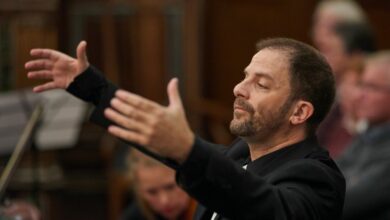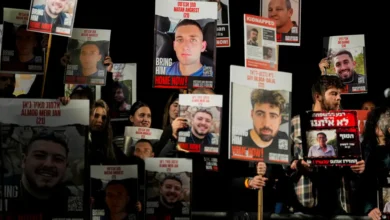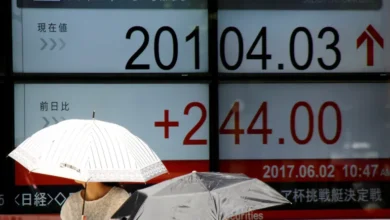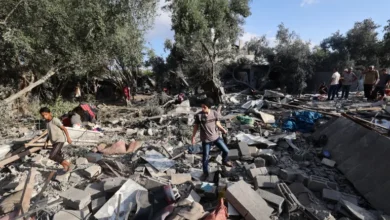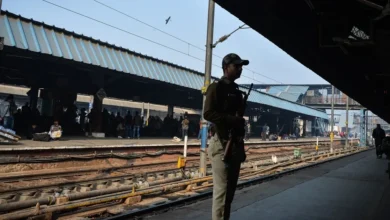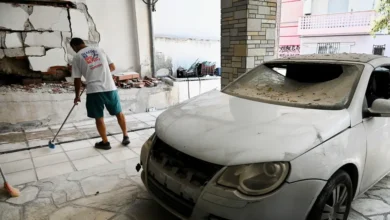Crowds stand in solidarity with local governments amid violent unrest
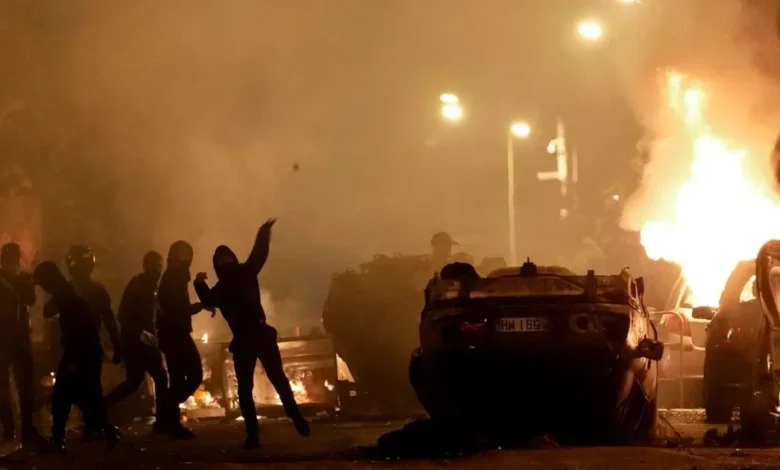
Crowds gathered at town halls across France Monday to show solidarity with local governments targeted in six nights of violence touched off by the fatal police shooting of a 17-year-old in suburban Paris.
The unrest, which appeared to be easing on Sunday night, was driven by a mainly teenage backlash in the suburbs and urban housing projects against a French state that many young people with immigrant roots say routinely discriminates against them. In all, 99 town halls have been attacked in the violence, the Interior Ministry said, including a weekend attempt to ram the home of one mayor with an explosives-laden car.
In the municipality of l’Hay-les-Les Roses in the southern suburbs of Paris, hundreds of people gathered Monday to support Mayor Vincent Jeanbrun, whose wife and one of his young children were injured as they fled early Sunday when their home was rammed by a car that rioters had set on fire.
It was an unusually personal attack that authorities said would be prosecuted as an attempted homicide, and it prompted an outpouring of support for local governments in many towns where the city hall is often literally central to public life.
“We saw the real face of the rioters, that of assassins,” Jeanbrun said in an emotional speech. France and “democracy itself” were being attacked in days of rioting. “This won’t last last,” the mayor said, adding that the “silent majority” is speaking out to say “Stop. This is enough!” The crowd responded with the chant “Enough!”
There has been little in the way of organized protests beyond a march last week for Nahel, the 17-year-old of Algerian descent who was killed last Tuesday in the Paris suburb of Nanterre. Instead, the anger has manifested in young people targeting police, with both sides using increasingly aggressive tactics.
The average age of the 3,354 people arrested over the past week was 17, the interior minister said. But the problem of discrimination strikes all ages, according to Ahmed Djamai, a 58-year-old born in Nanterre who attended a solidarity gathering Monday at the town hall.
Djamai said police stopped him not long ago and demanded a residence permit, even though he neither has nor needs one as a French citizen. He said the problem won’t go away even as the violence subsides.
“Our second, third and fourth-generation children face the same problem when they go out to get a job, when they go to prestigious universities,” he said. “They’re not accepted. So even now, the problem is social, but it’s also one of identity. It goes much deeper than that.”
French President Emmanuel Macron was meeting Tuesday with mayors of 220 towns from across the country. Across France, 34 buildings – many of them linked to the government – were attacked from Sunday into Monday, along with 297 vehicles.
Macron last week blamed social media for the spread of the unrest and called on parents to take responsibility for their teenagers. Justice Minister Eric Dupond-Moretti told France Inter radio that parents who abdicated that responsibility, “either through disinterest or deliberately,” would be prosecuted.
The anger has descended into attacks against symbols of the state, widespread arson and nighttime looting. Interior Minister Gerald Darmanin said during a visit to a town in central France that he’s been proven right to put 45,000 police on the streets in recent nights, but added that police “can’t educate children in the place of their parents.”
“We know all too well that this violence penalizes first and foremost the children, the people and the families of our neighborhoods and all of the residents of our city,” Nanterre Mayor Patrick Jarry said. “We want justice to be done for Nahel and for the appeal by the family and notably by his grandmother for an end to the violence and destruction to be heard and respected.”
In all, according to the Interior Ministry, there were 157 arrests overnight out of a total of 3,354 since last Tuesday, and two law enforcement stations were attacked, among other damage.
The interior minister said children as young as 12 or 13 had been detained for attacking law enforcement and setting fires.
In the Paris suburb of Clichy-sous-Bois, where a fire also struck the town hall, residents over the weekend said anger had simmered for years and many said the government had done little to help them.
“Young people are afraid to die by the hands of police. They are hopeless. They are bored and they need something to distract them so they don’t hang out in the streets,” said Samba Seck, 39.
